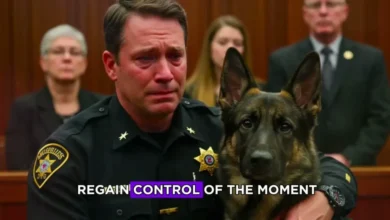“13 Years Without Seeing My Daughter — And Yesterday I Received a Letter from a Grandson I Never Knew Existed”

It’s been thirteen years since I last saw my daughter. At the time, she was only 13. That was when my wife, Carol, left me to be with my boss, Richard. Without warning, she packed her bags, took our daughter Alexandra, and disappeared. That hot summer day, I came home from work to find Carol in the kitchen. She looked at me coldly and said:
— “This isn’t working anymore. I’m leaving with Richard. I’m taking Alexandra. She deserves a better life.”
Hearing that felt like a punch to the gut. I worked hard at a construction company in Chicago. We weren’t rich, but we had a house in the suburbs, food on the table, and lived honestly. But for Carol, that was never enough. She wanted luxury, status, parties, expensive clothes. And Richard could give her all that.
After she left, I tried to stay in touch with my daughter. I wrote letters, called her, but eventually, she stopped answering. I later found out Carol had poisoned Alexandra against me, telling her I didn’t care about her, that I had cheated. Eventually, my daughter erased me from her life.
Crushed by grief, I got sick. I needed multiple surgeries, sold my house to pay medical bills, and lost my job. But little by little, I rebuilt my life. I managed to open my own construction business, and even living alone, I earned a stable and decent life.
I never married again. I always missed my daughter. Every year on her birthday, I wondered: “Does she still remember me?”
Then yesterday, something incredible happened. I found a letter in my mailbox. On the front, written in large, slightly crooked letters:
“To Grandpa Steve.”
My heart almost stopped. I opened the letter and read:
“Hi, Grandpa! My name is Adam. I’m 6 years old. Unfortunately, you’re the only family I have left…”
I was overwhelmed with indescribable emotion. In the letter, Adam said he was living in a children’s shelter in St. Louis. He said his mother, Alexandra, had once mentioned my name, and he hoped I would find him.
Without thinking twice, I bought a ticket. The next morning, I flew to St. Louis.
When I arrived at the shelter, I was greeted by Ms. Johnson, a kind woman who explained everything to me. Alexandra had gotten pregnant at 20 but was kicked out by Carol for not being married. She struggled for years to raise Adam, but eventually got involved with a wealthy man who didn’t want another man’s child. So, she made a cruel decision: she left Adam at the shelter.
— “She said he deserved a real home,” Ms. Johnson told me. “He mentioned your name, and I helped him find you. He was the one who asked to write the letter.”
When she asked if I was ready to meet him, my heart was pounding in my chest.
In the playground, I saw a small boy with messy brown hair and big blue eyes — just like Alexandra’s. He looked at me curiously and shyly said:
— “Hi.”
— “Hi, Adam. I’m your grandpa.”
He smiled, ran to me, and hugged me tightly.
— “I knew you’d come!”
In that moment, everything made sense. I had lost my daughter, but now I had a grandson. And with him, a new chance to make things right.
I promised Ms. Johnson I would take a DNA test and start the process of bringing him home with me. The road ahead would be long, but my heart already felt complete.
Life lesson:
Sometimes, the losses we face are just the beginning of something much greater. When we least expect it, life gives us the chance to rebuild — and to love again.
💳 Awareness: Credit Cards – The Villain Disguised as Convenience
Credit cards are seen by many as a facilitator of modern life. They allow online purchases, installment payments, theft protection, and access to perks like miles and cashback. However, behind this convenience lies one of the biggest causes of personal debt in Brazil.
The main issue is the lack of control and the false sense of purchasing power. Many consumers use their credit cards as if they were an extension of their income. They spend without planning, make several installments, and suddenly face an unpayable bill.
Using revolving credit — when you don’t pay the full amount — can trigger a snowball effect. Revolving credit interest rates are among the highest in the world, often exceeding 300% annually. That means a R$1,000 debt can turn into over R$4,000 in just a few months.
Beyond the financial damage, credit card misuse can lead to emotional crises like anxiety, stress, and even depression, especially when bills become impossible to cover.
How to avoid this trap?
- Set a personal spending limit below the one given by the bank.
- Use your card only for planned purchases.
- Avoid long and unnecessary installment plans.
- Never pay only the minimum bill amount.
- Use tools to monitor your spending.
- Reevaluate your spending habits and seek financial education.
Remember: A credit card can be an ally, but when misused, it becomes an invisible prison. The secret lies in balance and planning.





